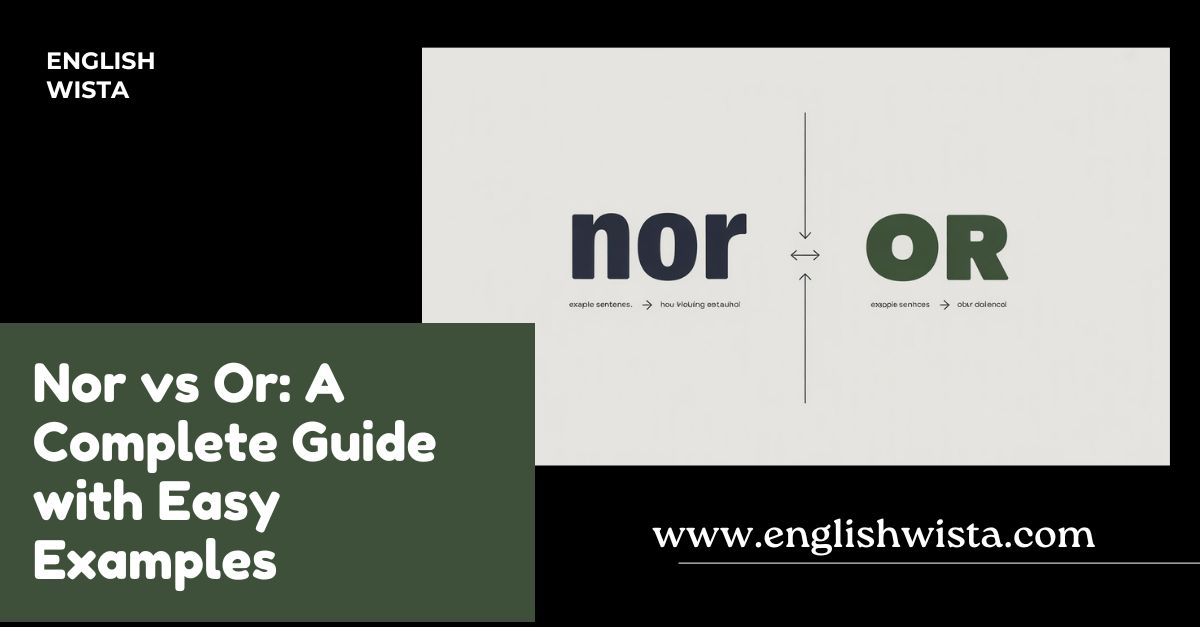Have you ever paused mid-sentence and wondered, “Wait should I use nor or or here?” You’re not alone. Even native English speakers sometimes mix them up because they sound a little alike and both deal with choices or options. But don’t worry once you understand the basic difference, it’s actually pretty simple.
This article will guide you step by step through the meaning of nor and or, when to use them, and how they differ. We’ll look at real-life examples, common mistakes, and even a few fun facts along the way. By the end, you’ll feel confident about using these words correctly, whether you’re writing an essay, chatting with friends, or just polishing your grammar skills.
So, let’s jump in and make nor vs or as easy as pie!
What Does Or Mean?
Let’s start with the more common word: or.
Definition: Or is a word we use to present choices, alternatives, or possibilities. Think of it as giving someone options.
- Do you want tea or coffee?
- We can go to the park or stay home.
- Should I call you tomorrow or next week?
In each case, or is offering different possibilities. You can usually pick one, but sometimes both could be true depending on context.
Key point: Or = choices, alternatives, or possibilities.
What Does Nor Mean?
Now let’s look at the less common word: nor.
Definition: Nor is used to show a negative alternative. In other words, it’s like saying “not this and not that.”
You’ll often see nor paired with neither, but it can also appear after not.
Examples:
- I like neither cats nor dogs. (I don’t like cats, and I don’t like dogs either.)
- She did not sing, nor did she dance. (She didn’t do either thing.)
- He owns neither a car nor a bike.
Key point: Nor = negative alternatives (not this, and not that).
Nor vs Or: The Core Difference
Here’s the simplest way to remember the difference:
- Use or when you’re giving options or choices.
- Use nor when you’re pointing out negative alternatives.
Quick comparison:
- Would you like pizza or pasta? (choices)
- I like neither pizza nor pasta. (negative alternatives)
Do You Always Need “Neither” Before “Nor”?
Great question! Most of the time, nor follows neither. That’s the most familiar pattern:
- Neither A nor B.
Examples:
- Neither the teacher nor the students knew the answer.
- She likes neither chocolate nor candy.
But nor doesn’t always need neither. It can follow not in more formal sentences:
- He didn’t call, nor did he text.
- The company doesn’t sell phones, nor does it sell tablets.
So while “neither…nor” is most common, nor has a little more flexibility than people often think.
Is “Nor” Old-Fashioned?
You might have noticed that people use or way more than nor. In fact, in everyday casual speech, you rarely hear nor. Instead, people often say:
- “I don’t like cats or dogs.” (instead of “neither cats nor dogs”)
So, is nor disappearing? Not quite. Nor still has an important role, especially in formal writing, essays, and professional communication. It adds clarity and rhythm when you want to emphasize negative alternatives.
Think of nor as the slightly more formal sibling of or. You don’t always need it, but when you do, it makes your sentence sharp and clear.
Real-Life Examples of Or
Let’s see or in action with practical examples.
- Do you want water or juice?
- Should we leave now or wait for the rain to stop?
- Is that your final answer, or do you want more time to think?
- You can call me tonight or tomorrow morning.
- Would you like to walk or take the bus?
Notice how every sentence offers a choice or alternative.
Real-Life Examples of Nor
Now let’s check out some examples of nor.
- She owns neither a phone nor a computer.
- He didn’t smile, nor did he wave.
- They had no tickets, nor any money.
- Neither the dog nor the cat likes baths.
- I don’t play football, nor do I watch it on TV.
In each case, nor emphasizes the negative removing both options instead of offering them.
Common Mistakes with Nor and Or
Even advanced learners sometimes slip up with these two words. Let’s highlight the most common errors so you can avoid them.
Mistake 1: Using “or” when you mean “nor.”
❌ I don’t like apples or oranges.
✔️ I don’t like apples, nor oranges. (or: I like neither apples nor oranges.)
Mistake 2: Forgetting parallel structure.
When you use neither…nor, both parts of the sentence should be in the same form.
❌ She likes neither to swim nor running.
✔️ She likes neither swimming nor running.
Mistake 3: Overusing nor in casual speech.
While nor is correct, in everyday conversations you might sound too formal if you use it all the time. It’s perfectly natural to say:
✔️ I don’t like apples or oranges.
Fun Memory Tricks
Want an easy way to remember when to use nor vs or? Try these:
- Or = Options (both start with “O”).
- Nor = Negative (both start with “N”).
That little trick can save you when you’re unsure.
The Origin of Nor and Or
Here’s a fun fact: both nor and or come from Old English.
- Or comes from the Old English word othre, meaning “other” or “second of two.”
- Nor comes from a combination of ne (meaning “not”) + or. So it literally means “not or.”
That explains why nor always carries a negative meaning.
Is Nor Singular or Plural?
Another common question is about subject-verb agreement. If you say “neither…nor,” should the verb be singular or plural?
The answer depends on the subject closest to the verb.
Examples:
- Neither the teacher nor the students are ready. (students = plural, so verb is plural)
- Neither the students nor the teacher is ready. (teacher = singular, so verb is singular)
So the rule is simple: match the verb with the subject that comes right before it.
Comparing Nor to Similar Words
To avoid confusion, let’s compare nor with a few similar terms.
Nor vs Neither
- Neither usually starts the pair, and nor connects the second idea.
- Example: Neither my brother nor my sister is home.
Nor vs And
- And adds things together. Nor excludes both things.
- Example: I like apples and oranges. (positive)
- Example: I like neither apples nor oranges. (negative)
Nor vs Or Not
- “Or not” is common in questions: Are you coming, or not?
- “Nor” doesn’t work here because it doesn’t ask it states negatives.
Practice Sentences
Here’s a little practice to test yourself. Fill in the blank with nor or or.
- Do you want pizza ___ pasta?
- Neither John ___ Mary showed up.
- Should I text you ___ call you later?
- He didn’t answer, ___ did he apologize.
- We can watch TV ___ go for a walk.
Answers:
- or
- nor
- or
- nor
- or
Fun Facts About “Nor” and “Or”
- Shakespeare used nor a lot in his plays, which is partly why it sounds more formal today.
- In logic and computer science, NOR is a type of gate that outputs true only when both inputs are false. So grammar even sneaks into technology!
- Kids often naturally use or first, because it’s simpler. Nor usually comes later in learning.
Quick Recap
Let’s sum it all up in plain language:
- Or = choices or alternatives.
- Nor = negative alternatives (not this, not that).
- “Neither…nor” is the most common pattern.
- In casual speech, or often replaces nor without confusion.
- In formal writing, nor makes sentences clearer and sharper.
Conclusion
So there you have it nor vs or explained in a simple, friendly way. Next time you’re writing and pause to think, just remember: or gives options, nor shuts them down.
Picture it like this: or opens doors, nor closes them.
Once you practice a few times, you’ll never mix them up again. And if you want to sound polished in essays or professional writing, don’t forget to give nor some love it may be less common, but it’s still powerful.
Now, go ahead and try making your own sentences with nor and or. You’ll be surprised at how quickly it starts to feel natural!



